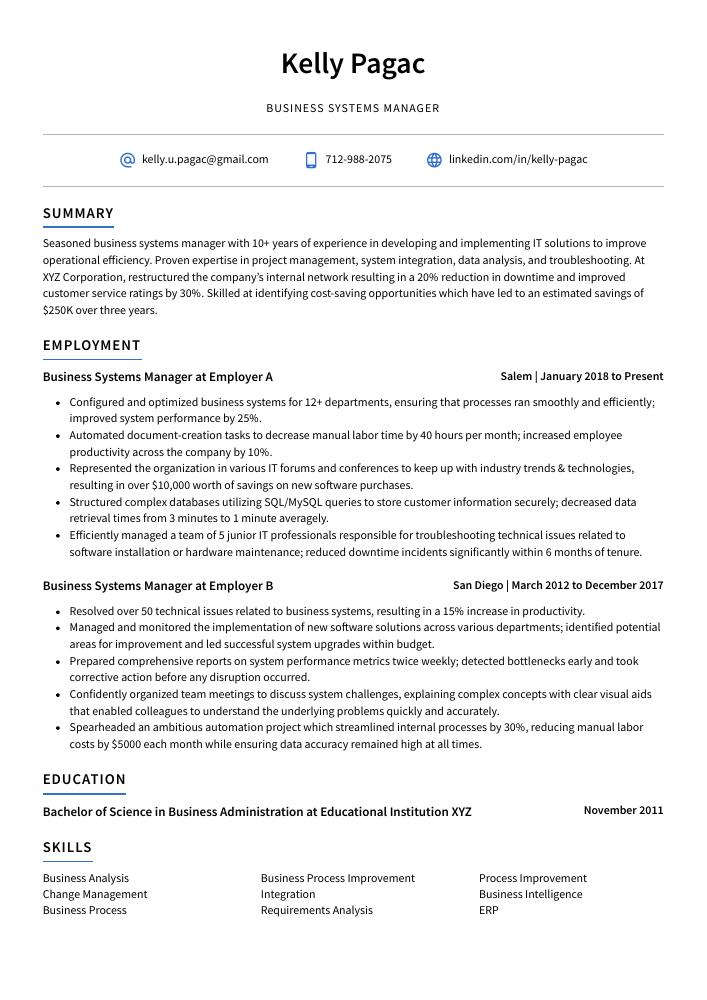Business Systems Manager Resume Guide
Business Systems Managers are responsible for the development and implementation of computer systems to support various business operations. They analyze user requirements, design system solutions, develop software applications, install hardware components, test new systems, and maintain existing ones. Additionally, they provide technical guidance to staff members in order to ensure that users can effectively utilize all available resources.
Your knowledge and experience in business systems management make you the perfect candidate for any company. However, employers won’t see your potential until you write a resume that shows them what you can do.
This guide will walk you through the entire process of creating a top-notch resume. We first show you a complete example and then break down what each resume section should look like.
Table of Contents
The guide is divided into sections for your convenience. You can read it from beginning to end or use the table of contents below to jump to a specific part.
Business Systems Manager Resume Sample
Kelly Pagac
Business Systems Manager
kelly.u.pagac@gmail.com
712-988-2075
linkedin.com/in/kelly-pagac
Summary
Seasoned business systems manager with 10+ years of experience in developing and implementing IT solutions to improve operational efficiency. Proven expertise in project management, system integration, data analysis, and troubleshooting. At XYZ Corporation, restructured the company’s internal network resulting in a 20% reduction in downtime and improved customer service ratings by 30%. Skilled at identifying cost-saving opportunities which have led to an estimated savings of $250K over three years.
Experience
Business Systems Manager, Employer A
Salem, Jan 2018 – Present
- Configured and optimized business systems for 12+ departments, ensuring that processes ran smoothly and efficiently; improved system performance by 25%.
- Automated document-creation tasks to decrease manual labor time by 40 hours per month; increased employee productivity across the company by 10%.
- Represented the organization in various IT forums and conferences to keep up with industry trends & technologies, resulting in over $10,000 worth of savings on new software purchases.
- Structured complex databases utilizing SQL/MySQL queries to store customer information securely; decreased data retrieval times from 3 minutes to 1 minute averagely.
- Efficiently managed a team of 5 junior IT professionals responsible for troubleshooting technical issues related to software installation or hardware maintenance; reduced downtime incidents significantly within 6 months of tenure.
Business Systems Manager, Employer B
San Diego, Mar 2012 – Dec 2017
- Resolved over 50 technical issues related to business systems, resulting in a 15% increase in productivity.
- Managed and monitored the implementation of new software solutions across various departments; identified potential areas for improvement and led successful system upgrades within budget.
- Prepared comprehensive reports on system performance metrics twice weekly; detected bottlenecks early and took corrective action before any disruption occurred.
- Confidently organized team meetings to discuss system challenges, explaining complex concepts with clear visual aids that enabled colleagues to understand the underlying problems quickly and accurately.
- Spearheaded an ambitious automation project which streamlined internal processes by 30%, reducing manual labor costs by $5000 each month while ensuring data accuracy remained high at all times.
Skills
- Business Analysis
- Business Process Improvement
- Process Improvement
- Change Management
- Integration
- Business Intelligence
- Business Process
- Requirements Analysis
- ERP
Education
Bachelor of Science in Business Administration
Educational Institution XYZ
Nov 2011
Certifications
Certified Business Systems Manager
International Association of Business Analysts
May 2017
1. Summary / Objective
The summary/objective at the start of your business systems manager resume should provide a snapshot of who you are and what makes you an ideal candidate for the role. This is where you can highlight your technical expertise, such as experience with ERP systems or SQL databases, as well as any certifications or awards that demonstrate your commitment to excellence in this field. Additionally, mention how many years’ experience you have working on system implementations and upgrades.
Below are some resume summary examples:
Energetic and experienced business systems manager with 10+ years of experience in the technology industry. Proven track record of leading teams, project management, system implementation, software engineering, data analysis and problem-solving. Skilled in developing strategies to optimize operational processes while ensuring compliance with best practices and regulatory standards. Experienced in managing cross-functional projects from conception through completion to ensure successful execution.
Professional business systems manager with 8+ years of experience in IT operations and project management. Skilled at leading cross-functional teams, implementing business solutions, troubleshooting issues, and optimizing current processes to improve efficiency. At XYZ Co., successfully managed the development of a new HR system that increased employee satisfaction by 30%. Proven track record of problem-solving abilities to ensure successful delivery of projects on time and under budget.
Committed Business Systems Manager with 8+ years of experience leading business technology projects and providing technical guidance to cross-functional teams. Proven record of success in streamlining IT processes and operations, overseeing database management, implementing new systems, and driving user adoption. Seeking to join ABC Company as the next Business System Manager to ensure optimal system performance while delivering cost savings through efficient use of resources.
Enthusiastic business systems manager offering 8+ years of experience leading the implementation and maintenance of organizational technology solutions. Proven track record in streamlining existing processes, increasing productivity, and reducing costs. Skilled at managing large-scale projects involving multiple stakeholders while ensuring quality results on time and within budget. Experienced with a wide range of software applications including ERP, CRM, BI tools etc.
Detail-oriented business systems manager with 10+ years of experience in network management, system security and implementation of new technologies. Seeking to use my expertise and knowledge in the development, maintenance and support of ABC’s IT infrastructure. Successfully managed multiple projects including a project which improved time-to-market by 16%. Also implemented processes that streamlined operations resulting in cost savings up to 20%.
Dependable business systems manager with 10+ years of experience leading and directing IT projects for various business operations. Adept at developing solutions to meet ever-changing customer needs, streamlining workflow processes, and improving application performance. Committed to utilizing my expertise in problem solving, system implementation, and technical support to ensure the success of ABC’s digital transformation initiatives.
Diligent business systems manager with 10+ years of experience in overseeing the design and implementation of innovative business solutions. Experienced in leading teams to develop cost-effective, user-friendly applications that improve operational efficiency and enhance client satisfaction. Adept at managing projects from concept through completion while ensuring compliance with company policies and industry regulations.
Hard-working business systems manager with 8+ years of experience leading technical development projects and spearheading the implementation of new business software solutions. Proven track record in overseeing system integrations, developing process improvements, and optimizing existing applications to increase efficiency by 20%. Seeking to join ABC Company’s IT department as a systems manager to help drive innovation.
2. Experience / Employment
In the experience section, you should provide details on your employment history. This should be written in reverse chronological order, so the most recent job is listed first.
You want to use bullet points primarily when writing this section; doing so makes it easier for the reader to take in what you have to say quickly and efficiently. When stating what you did, make sure that each point has detail and quantifiable results if possible.
For example, instead of saying “Managed business systems,” you could say “Developed a comprehensive system management strategy which resulted in an 8% increase in efficiency across all departments.”
To write effective bullet points, begin with a strong verb or adverb. Industry specific verbs to use are:
- Managed
- Analyzed
- Implemented
- Monitored
- Administered
- Developed
- Optimized
- Automated
- Configured
- Troubleshot
- Documented
- Upgraded
- Tested
- Resolved
- Streamlined
Other general verbs you can use are:
- Achieved
- Advised
- Assessed
- Compiled
- Coordinated
- Demonstrated
- Expedited
- Facilitated
- Formulated
- Improved
- Introduced
- Mentored
- Participated
- Prepared
- Presented
- Reduced
- Reorganized
- Represented
- Revised
- Spearheaded
- Structured
- Utilized
Below are some example bullet points:
- Accurately maintained and updated business systems for over 200 users, ensuring that all software was compliant with industry standards; increased efficiency of processes by 10%.
- Participated in the implementation of a new ERP system across multiple departments; streamlined operations within 6 months from launch date.
- Reorganized existing databases to optimize data storage and retrieval capabilities, resulting in an 18% decrease in manual processing time.
- Developed custom tools and scripts to automate redundant tasks as needed, reducing labor costs by $20K annually.
- Analyzed usage trends for various applications on a weekly basis to identify areas needing improvement or upgrades; identified 25+ opportunities for cost savings that were then implemented successfully.
- Monitored and maintained business systems, ensuring that all areas of the network were secure; reduced security breaches by 40% over a two-year period.
- Reduced IT costs by optimizing system operations, troubleshooting software issues and maintaining computer equipment in good condition at all times.
- Competently managed customer service inquiries while providing technical support to staff members on site; effectively resolved 95% of reported cases within one hour or less per day.
- Tested new applications for compatibility with existing systems and debugged errors found during quality assurance testing prior to release; successfully implemented 5+ upgrades in the last year without any disruption to daily workflow processes or data loss/corruption incidents.
- Advised executive management team on best practices for maximizing efficiency when utilizing business technology solutions, resulting in cost savings of $17K+.
- Mentored a team of 8 software engineers in developing and implementing technical solutions for complex business systems, leading to an increase in cost savings by 15%.
- Assessed corporate IT infrastructure against company standards and best practices; identified deficiencies that resulted in improved system performance by 20% within the first month.
- Streamlined end-user processes across multiple departments with over 400 employees, reducing average response time from 10 minutes to 3 minutes per user query.
- Formulated new policies & procedures around data security protocols, increasing overall compliance rating by 25% as well as mitigating risk exposure on sensitive customer information stored on internal servers & cloud databases.
- Diligently monitored project timelines while managing 30+ tasks simultaneously; completed projects up to 5 days ahead of schedule without compromising quality or functionality requirements set forth at the start of each initiative.
- Optimized business systems for a large-scale organization, resulting in an 18% decrease in operational costs and increased employee productivity by 10%.
- Documented system processes, procedures and training materials to ensure uniform implementation of IT solutions across the entire enterprise.
- Demonstrated strong technical expertise while managing 150+ users on multiple platforms including Windows Server 2008/2012, Linux (CentOS), Mac OS X and Active Directory Services; trained 15 new employees over 6 months on network security protocols & best practices.
- Proficiently administered database projects such as MySQL/Oracle databases using SQL scripting languages to facilitate data sharing between departments which enabled faster decision making capabilities for management teams.
- Monitored server performance on daily basis to identify bottlenecks or potential risks that could lead to downtimes; successfully minimized outages from 5 hours per week to only 2 hours per month with proactive maintenance strategies.
- Upgraded business systems and processes in line with changing industry trends, increasing customer satisfaction scores by 12%.
- Utilized a variety of software programs to administer daily tasks such as data entry, billing, payroll and customer relationship management; saved 200+ hours of employee work time over 6 months.
- Consistently monitored the performance of business systems to identify opportunities for improvement or optimization; implemented new strategies that resulted in $20K cost savings annually.
- Compiled detailed reports on system usage metrics and presented findings to senior leadership teams on request; improved IT operations efficiency by 22% within 3 months.
- Improved user experience when interacting with business applications through UI/UX design changes which increased customer engagement levels by 16%.
- Coordinated the implementation of multiple business systems to streamline internal processes, resulting in a 30% improvement in productivity and an 8% reduction in operational costs.
- Introduced new system integration tools to ensure seamless data transfer between departments; automated reporting process saved 2 hours per day for staff members.
- Facilitated regular training sessions on business systems usage for over 150 employees, leading to increased understanding and better compliance with standard operating procedures (SOPs).
- Expedited troubleshooting efforts by implementing proactive maintenance measures which minimized downtime and improved overall performance of corporate networks by 20%.
- Thoroughly tested all updates prior to deployment, ensuring that software applications were bug-free while reducing user error incidents by 12%.
- Achieved a 10% increase in business efficiency by streamlining processes and automating tedious tasks.
- Presented cost-benefit analysis for various system upgrades to C-level executives, resulting in the successful implementation of multiple new technologies that improved customer service levels by 15%.
- Successfully managed the migration from legacy systems to more modern solutions, allowing an additional 30 staff members to work remotely without impacting productivity or data security standards.
- Revised existing policies and procedures related to IT infrastructure management as well as software development life cycles; increased adherence rate among stakeholders by 20%.
- Implemented automated monitoring tools across 100+ hardware nodes throughout 5 global locations, reducing downtime incidents due to system failures by 50%.
3. Skills
Skill requirements will differ from employer to employer – this can easily be determined via the job advert. Organization ABC may be looking for someone with experience in developing and managing business systems, while Organization XYZ may require a candidate who is proficient in using specific software.
It is important to tailor the skills section of your resume to each job that you are applying for because many employers use applicant tracking systems these days. These computer programs scan resumes for certain keywords before passing them on to human recruiters; therefore, if those words aren’t present then your application will likely not make it past this stage.
Once listed here, you can further elaborate on the most relevant ones by discussing them in more detail elsewhere – such as within the summary or experience sections of your resume.
Below is a list of common skills & terms:
- Access
- Account Management
- Accounting
- Active Directory
- Agile Methodologies
- Analysis
- Business Analysis
- Business Development
- Business Intelligence
- Business Process
- Business Process Improvement
- Business Strategy
- CRM
- Change Management
- Cloud Computing
- Continuous Improvement
- Contract Management
- Contract Negotiation
- Cross Functional Team Leadership
- Data Analysis
- Databases
- Disaster Recovery
- ERP
- Enterprise Resource Planning
- Enterprise Software
- Forecasting
- IT Management
- IT Service Management
- IT Strategy
- ITIL
- Information Technology
- Integration
- Lean Manufacturing
- MS Project
- Manufacturing
- Microsoft SQL Server
- Operations Management
- Oracle
- PRINCE2
- Process Improvement
- Procurement
- Program Management
- Project Delivery
- Project Planning
- Quality Assurance
- Requirements Analysis
- Requirements Gathering
- Risk Management
- SAP
- SDLC
- SQL
- SharePoint
- Software Development
- Software Documentation
- Software Project Management
- Stakeholder Management
- Strategy
- Supply Chain Management
- System Administration
- Systems Analysis
- Team Leadership
- Team Management
- Testing
- Troubleshooting
- Vendor Management
- Visio
- Windows Server
4. Education
Including an education section on your resume will depend on how much experience you have in the field. If you just graduated and don’t have any work history, list your education below your resume objective. However, if you’ve been working as a business systems manager for many years and want to showcase that instead of academics, omitting an education section is perfectly acceptable.
If including an education section is necessary or desired, try to mention courses related to the position such as information technology management or project management principles.
Bachelor of Science in Business Administration
Educational Institution XYZ
Nov 2011
5. Certifications
Certifications are a great way to demonstrate your proficiency in a particular field and show potential employers that you are committed to staying up-to-date with the latest industry knowledge.
Including certifications on your resume can be an effective way of demonstrating that you have the necessary skills for the job, as well as highlighting any additional qualifications or training courses you may have taken.
Certified Business Systems Manager
International Association of Business Analysts
May 2017
6. Contact Info
Your name should be the first thing a reader sees when viewing your resume, so ensure its positioning is prominent. Your phone number should be written in the most commonly used format in your country/city/state, and your email address should be professional.
You can also choose to include a link to your LinkedIn profile, personal website, or other online platforms relevant to your industry.
Finally, name your resume file appropriately to help hiring managers; for Kelly Pagac, this would be Kelly-Pagac-resume.pdf or Kelly-Pagac-resume.docx.
7. Cover Letter
Including a cover letter with your job application is a great way to give hiring managers more insight into who you are and why you’re the best fit for their role. It typically consists of 2 to 4 paragraphs in length, separate from your resume.
Cover letters provide an opportunity for you to explain how your skills, qualifications and experience make you suitable for the position applied for – giving recruiters a better understanding of what makes you unique as a professional.
Below is an example cover letter:
Dear Asa,
As a certified Business Systems Manager with more than 10 years of experience overseeing system implementations and integrations, I am confident I will make an immediate contribution to your organization. In my previous role as Business Systems Manager at XYZ Corporation, I was responsible for leading a team of developers in the design, development, testing, and deployment of new business applications. My experience managing all aspects of the software development life cycle makes me uniquely qualified for this position.
I have a proven track record of successful project management and have successfully implemented systems using both Agile and waterfall methodologies. In addition to my technical expertise, I also possess strong interpersonal skills that allow me to effectively communicate with stakeholders at all levels. My ability to manage multiple projects simultaneously while meeting strict deadlines is one of my greatest strengths.
I am excited about the opportunity to join ABC Corporation and would welcome the chance to discuss how my skills and experience can be leveraged to benefit your organization. Thank you for your time and consideration; I look forward to hearing from you soon.
Sincerely,
Kelly
Business Systems Manager Resume Templates
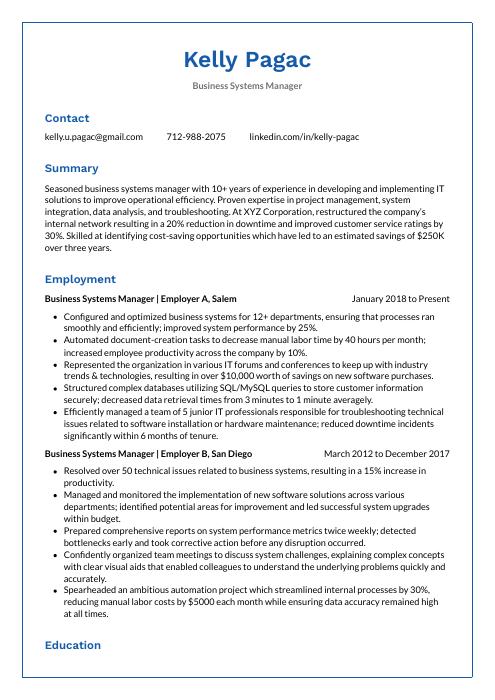 Markhor
Markhor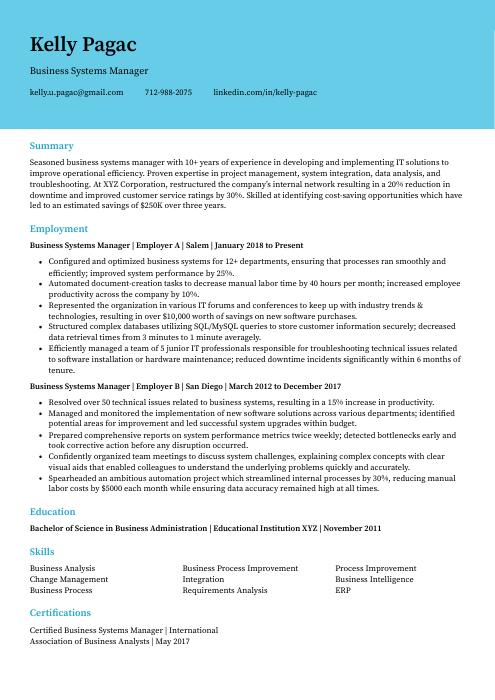 Dugong
Dugong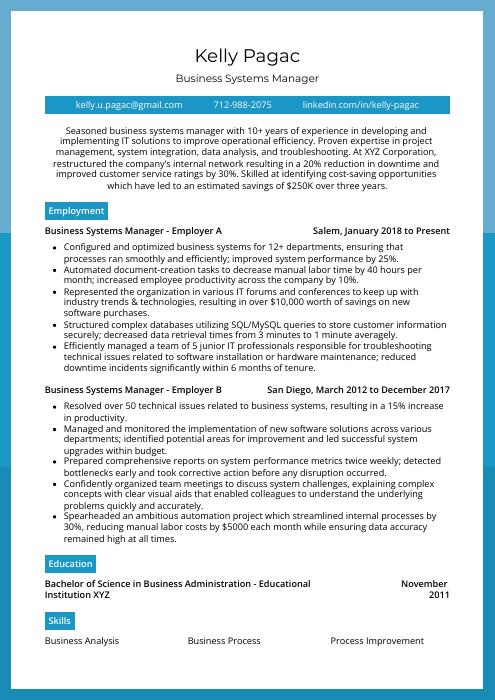 Rhea
Rhea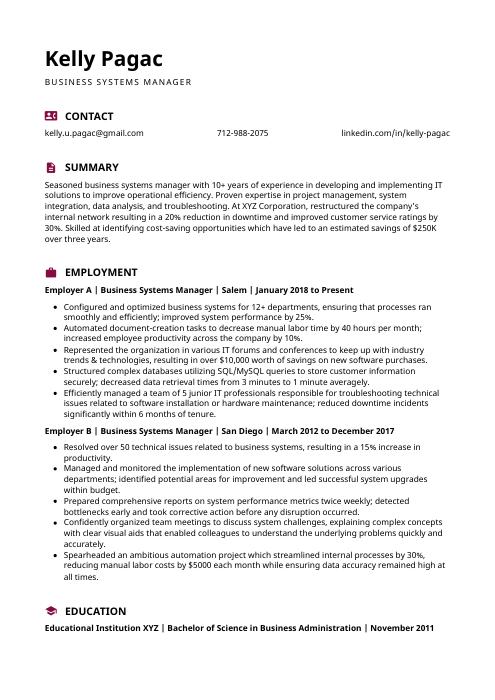 Hoopoe
Hoopoe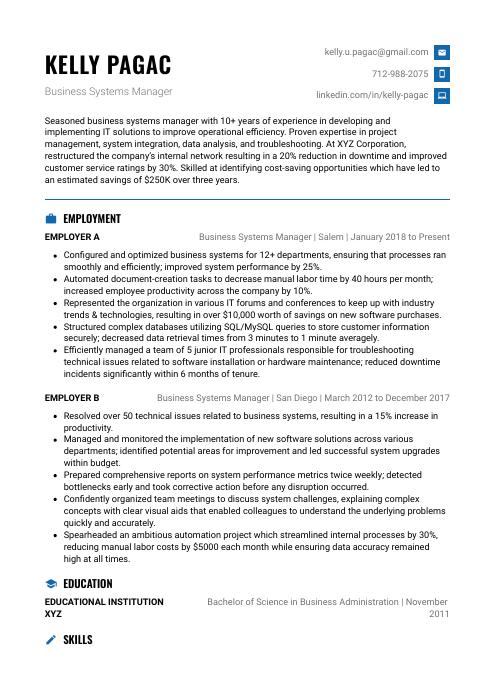 Echidna
Echidna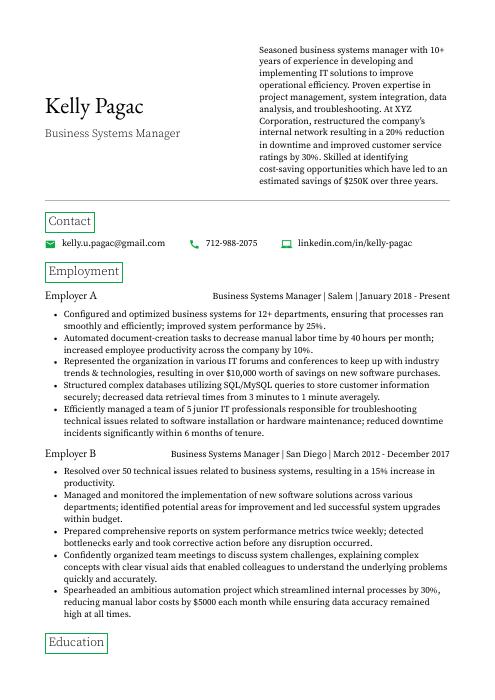 Quokka
Quokka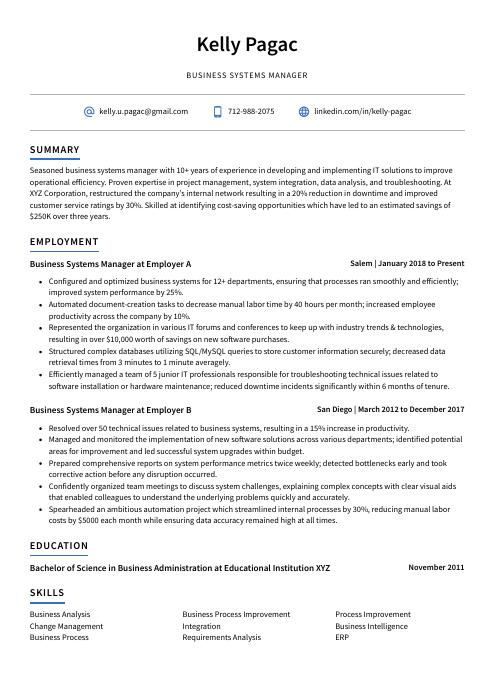 Axolotl
Axolotl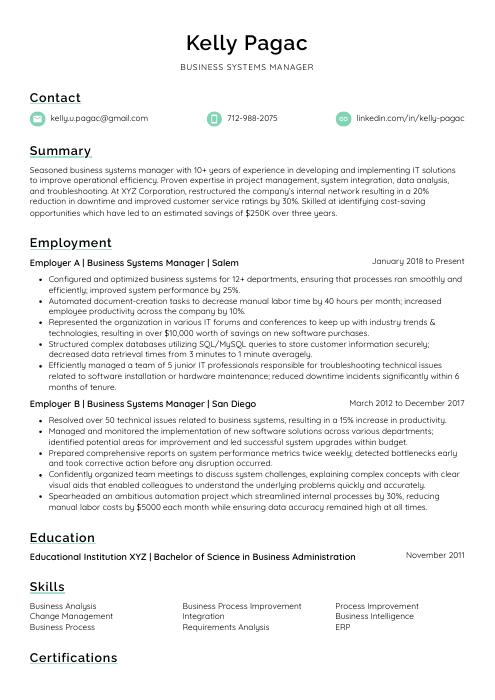 Lorikeet
Lorikeet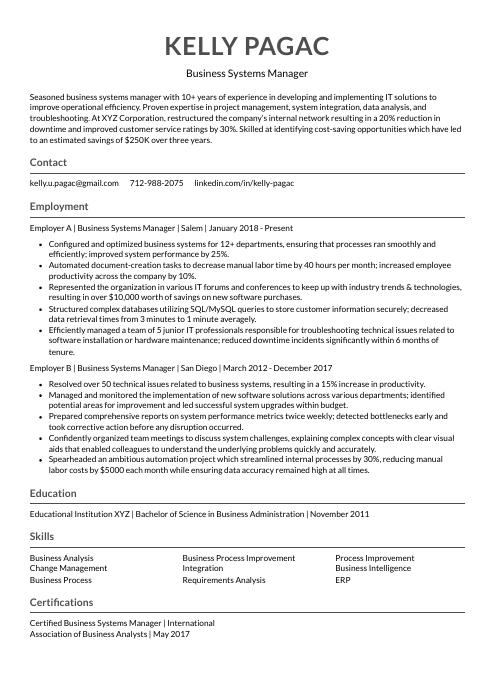 Indri
Indri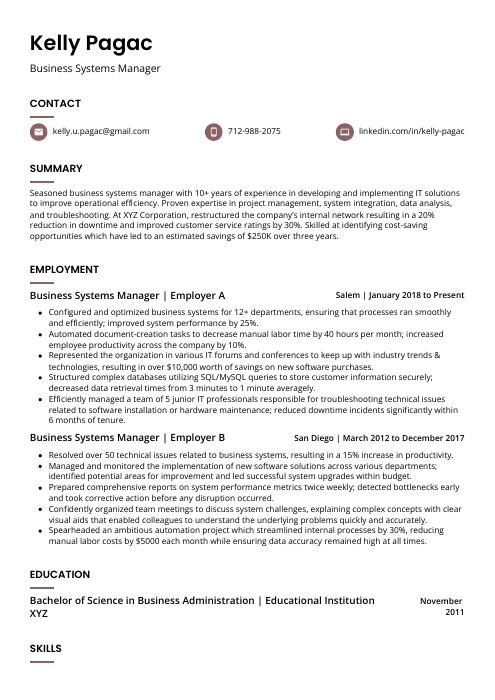 Fossa
Fossa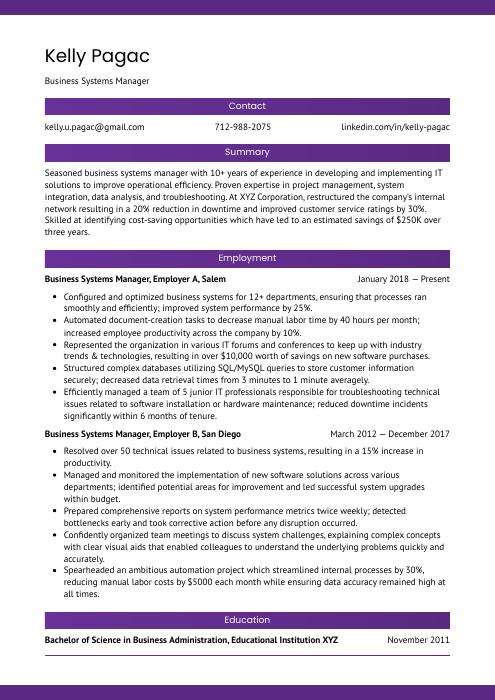 Jerboa
Jerboa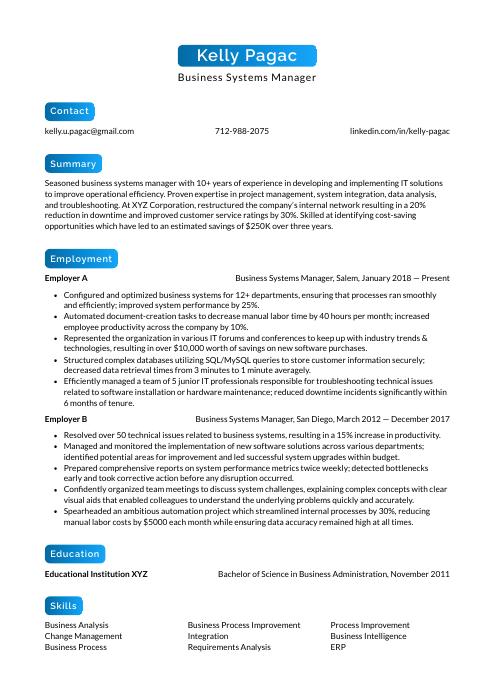 Kinkajou
Kinkajou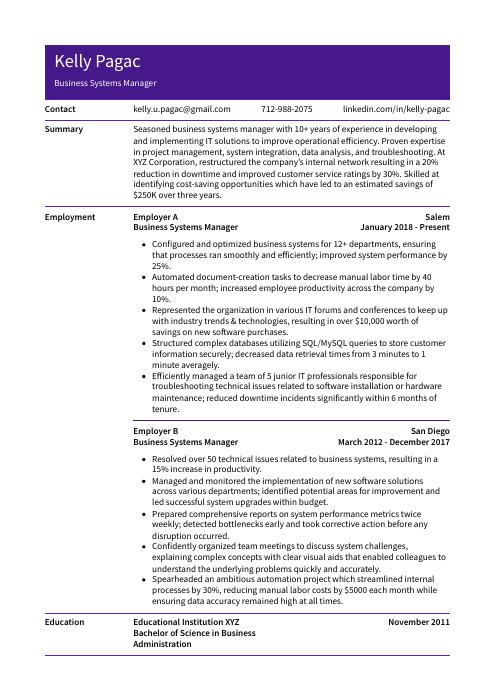 Pika
Pika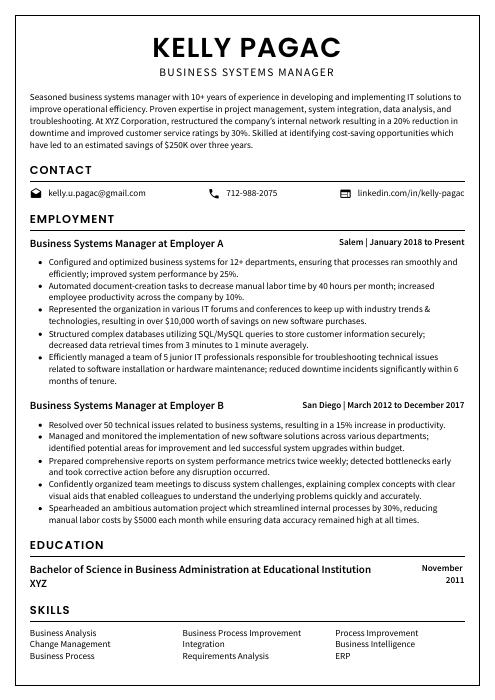 Cormorant
Cormorant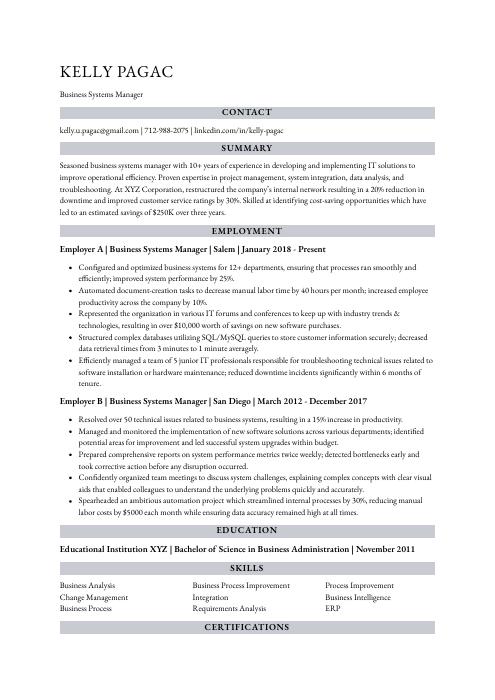 Numbat
Numbat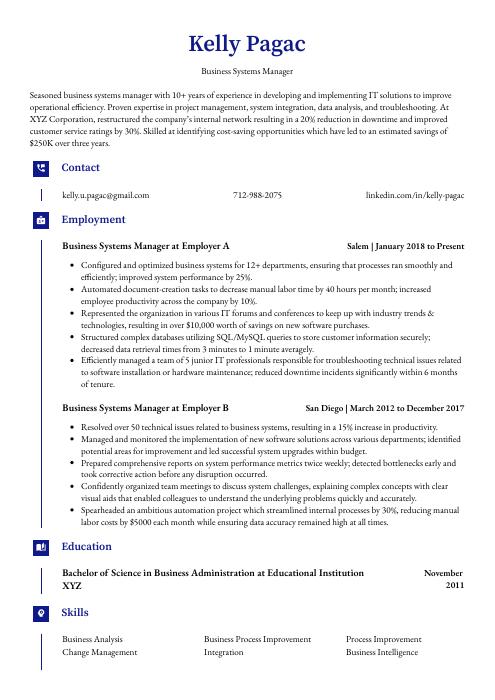 Gharial
Gharial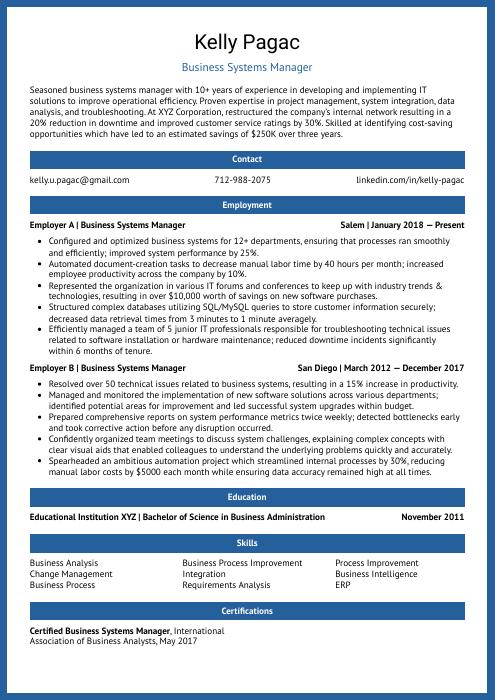 Ocelot
Ocelot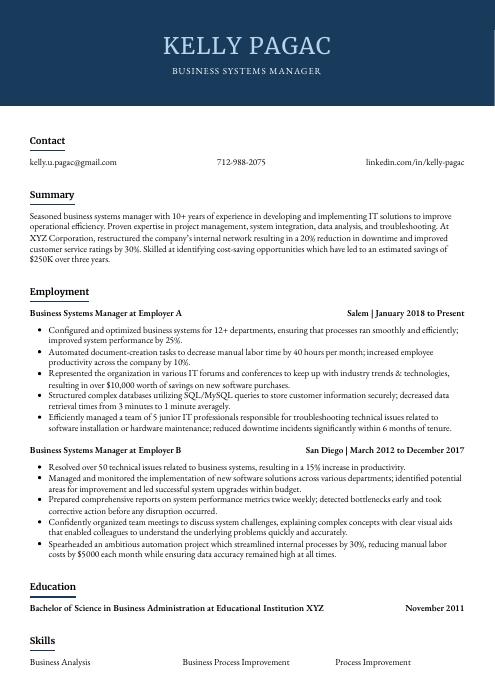 Bonobo
Bonobo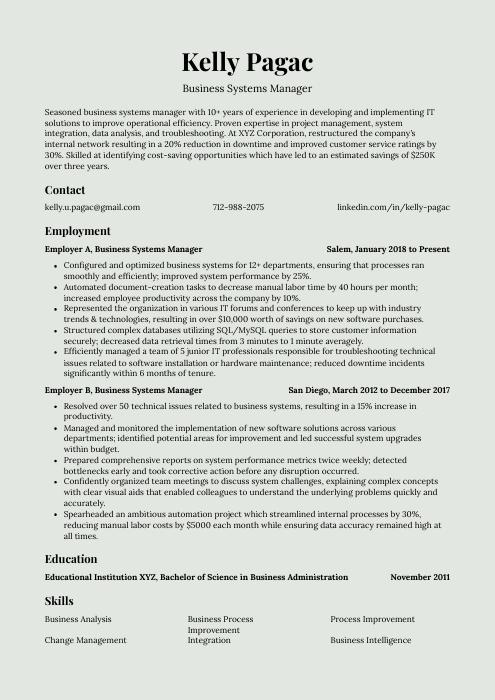 Saola
Saola Rezjumei
Rezjumei
